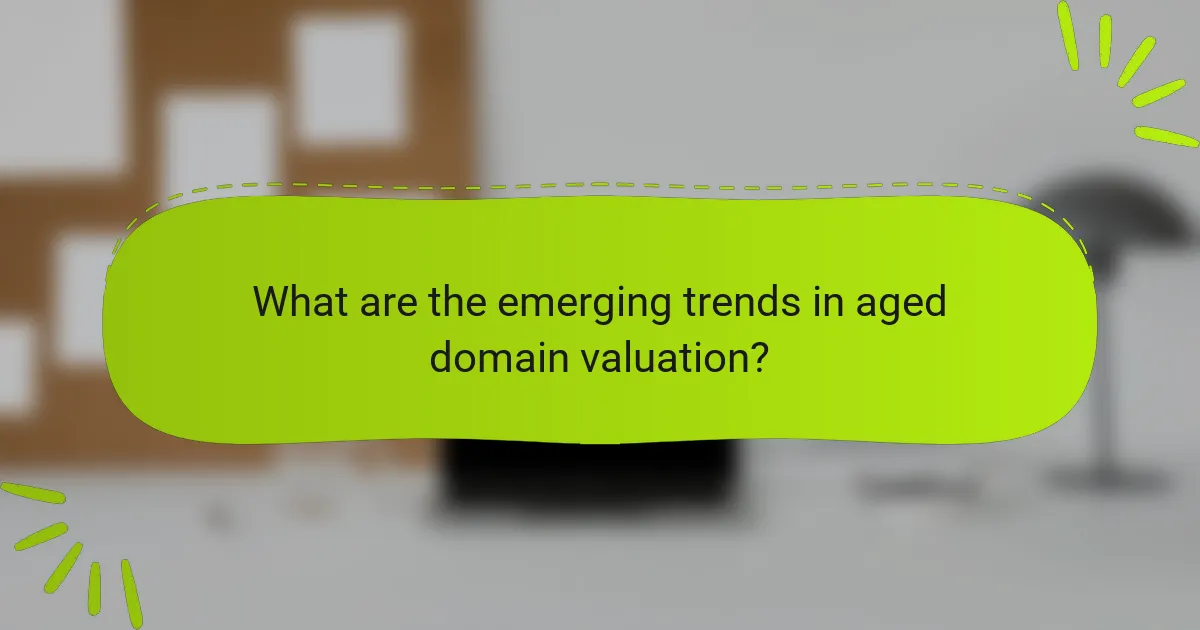In the rapidly evolving digital landscape, technology advancements play a crucial role in the valuation of aged domains. Enhanced algorithms and data analytics improve the accuracy of assessments, allowing investors to make more informed decisions based on critical factors such as domain age, authority, and backlink quality.

How do technology advancements affect aged domain valuation?
Technology advancements significantly influence aged domain valuation by enhancing the methods and tools used to assess domain worth. As algorithms and data analytics improve, the accuracy and reliability of valuations increase, leading to more informed investment decisions.
Increased algorithm sophistication
Modern algorithms analyze a wide range of factors that contribute to domain value, such as keyword relevance, traffic metrics, and backlink profiles. These sophisticated models can evaluate domains more comprehensively than traditional methods, often incorporating machine learning techniques to refine their assessments over time.
For example, an aged domain with a strong backlink profile may be valued higher due to its potential for organic traffic, which sophisticated algorithms can quantify more precisely. Investors should consider how these algorithms weigh different factors when evaluating potential purchases.
Enhanced data analytics tools
Advancements in data analytics tools allow for deeper insights into domain performance and market trends. Tools that aggregate and analyze data from various sources can provide a clearer picture of a domain’s historical performance and its competitive landscape.
For instance, platforms that track domain sales and auction results can help investors identify patterns and set realistic price expectations. Utilizing these tools can significantly enhance decision-making and reduce the risk of overpaying for a domain.
Impact of AI on valuation accuracy
Artificial intelligence (AI) plays a crucial role in improving the accuracy of domain valuations by processing vast amounts of data quickly and identifying trends that may not be immediately apparent. AI-driven tools can assess factors like user engagement and market demand, providing a more nuanced valuation than manual methods.
Investors should leverage AI tools to gain insights into potential future trends, which can inform their purchasing strategies. However, it’s essential to remain cautious and not rely solely on AI-generated valuations, as human judgment is still critical in evaluating the context and unique aspects of each domain.

What are the key factors in aged domain valuation?
The valuation of aged domains hinges on several critical factors that influence their market worth. Key elements include domain age, authority, backlink quality, and historical traffic data, each contributing to the domain’s perceived value and potential for generating revenue.
Domain age and authority
Domain age refers to how long a domain has been registered and active, which can significantly impact its authority. Older domains are often viewed as more trustworthy by search engines, leading to better rankings and visibility. Generally, domains aged over five years are considered more valuable due to their established presence.
Authority is determined by various factors, including the domain’s history and its reputation within its niche. A domain with a long-standing history of quality content and engagement tends to command higher prices in the market.
Backlink profile quality
The quality of a domain’s backlink profile is crucial for its valuation. High-quality backlinks from reputable sites enhance a domain’s authority and search engine ranking. A strong backlink profile typically includes links from diverse, relevant sources that have their own authority.
When assessing a domain’s backlink profile, consider factors such as the number of backlinks, the quality of the linking domains, and the relevance of the content. Tools like Ahrefs or Moz can help evaluate these aspects effectively.
Historical traffic data
Historical traffic data provides insights into a domain’s past performance and potential future value. Domains with consistent traffic trends, especially from organic search, are generally more desirable. Analyzing traffic patterns can reveal seasonal fluctuations and overall engagement levels.
When evaluating historical traffic, look for metrics such as average monthly visitors, traffic sources, and user behavior. Tools like Google Analytics can offer valuable data, helping prospective buyers make informed decisions about the domain’s worth.

What technologies are shaping domain valuation?
Technological advancements are significantly influencing domain valuation by enhancing data analysis, ownership verification, and search engine optimization. These innovations streamline the valuation process and provide more accurate assessments of domain worth.
Machine learning applications
Machine learning is transforming domain valuation by analyzing vast datasets to identify patterns and trends. Algorithms can assess factors such as keyword relevance, historical sales data, and market demand, enabling more precise valuations.
For example, machine learning models can predict future domain value based on current market conditions and comparable sales. This predictive capability helps investors make informed decisions about buying or selling domains.
Blockchain for ownership verification
Blockchain technology enhances domain valuation by providing a secure and transparent method for verifying ownership. This decentralized ledger ensures that domain ownership records are tamper-proof and easily accessible.
Using blockchain, potential buyers can confidently verify the authenticity of a domain’s ownership history, reducing the risk of fraud. This trust factor can increase a domain’s market value, as buyers are more likely to invest in verified assets.
SEO tools like Ahrefs and SEMrush
SEO tools such as Ahrefs and SEMrush play a crucial role in domain valuation by providing insights into a domain’s search engine performance. These tools analyze metrics like organic traffic, backlink profiles, and keyword rankings, which are essential for assessing a domain’s potential value.
Investors can use these insights to gauge a domain’s marketability and competitive advantage. For instance, a domain with high organic traffic and strong backlinks is likely to command a higher price compared to one with minimal visibility.

How to leverage technology for better domain investment?
Leveraging technology can significantly enhance domain investment strategies by providing data-driven insights and automating processes. By utilizing advanced tools, investors can make informed decisions, optimize their portfolios, and identify valuable opportunities in the domain market.
Utilizing predictive analytics
Predictive analytics involves using historical data and algorithms to forecast future trends in domain valuation. By analyzing patterns in domain sales, traffic, and market demand, investors can identify which domains are likely to appreciate in value. This method can help prioritize investments in domains that align with emerging trends.
Investors should consider using platforms that offer predictive analytics specifically tailored for the domain market. These tools can provide insights into potential ROI and help in making strategic decisions regarding domain acquisitions.
Automated valuation models
Automated valuation models (AVMs) use algorithms to estimate the worth of a domain based on various factors such as keyword popularity, length, and market trends. These models can quickly assess a large number of domains, saving time and effort compared to manual evaluations. However, it is essential to understand that AVMs may not account for unique characteristics that could influence a domain’s value.
When using AVMs, investors should cross-reference the valuations with market data and recent sales to ensure accuracy. Combining AVM insights with human judgment can lead to more informed investment decisions.
Real-time market analysis tools
Real-time market analysis tools provide up-to-date information on domain sales, trends, and competitive pricing. These tools allow investors to monitor the market continuously and react swiftly to changes, ensuring they do not miss out on lucrative opportunities. Features such as alerts for price drops or new listings can be particularly beneficial.
Investors should choose tools that offer comprehensive data and user-friendly interfaces. Regularly reviewing market conditions and adjusting investment strategies based on real-time insights can enhance overall performance in domain investing.

What are the emerging trends in aged domain valuation?
Emerging trends in aged domain valuation are significantly influenced by advancements in technology, particularly artificial intelligence, user experience metrics, and a growing emphasis on niche markets. These trends are reshaping how domain values are assessed and prioritized in the digital landscape.
Integration of AI in valuation processes
The integration of artificial intelligence in aged domain valuation is revolutionizing the way domains are assessed. AI algorithms can analyze vast amounts of data, identifying patterns and trends that human evaluators might overlook. This leads to more accurate valuations based on predictive analytics.
For instance, AI can evaluate historical performance data and current market trends to provide a more nuanced valuation. Companies are increasingly adopting AI tools that can automate these processes, reducing time and potential human error.
Increased focus on user experience metrics
There is a growing emphasis on user experience metrics when valuing aged domains. Factors such as site speed, mobile responsiveness, and user engagement are becoming critical indicators of a domain’s worth. Domains that provide a superior user experience are often valued higher due to their potential for better conversion rates.
Valuators are now considering metrics like bounce rates and average session duration as part of their assessment. This shift means that domains with strong user engagement are likely to command higher prices in the market.
Shift towards niche market domains
The trend is shifting towards valuing niche market domains, as businesses seek to target specific audiences more effectively. Aged domains that cater to specialized markets can offer unique advantages, such as established authority and a loyal customer base.
Valuators are recognizing that niche domains may have higher potential returns despite lower overall traffic. For example, a domain focused on organic gardening may attract a dedicated audience willing to pay a premium for relevant products and services.

How can investors adapt to technological changes in domain valuation?
Investors can adapt to technological changes in domain valuation by staying informed about emerging tools and trends that affect the market. Understanding these advancements allows investors to make more informed decisions and capitalize on new opportunities.
Continuous education on new tools
Investors should prioritize continuous education on the latest valuation tools and technologies. This includes familiarizing themselves with software that analyzes domain performance, market trends, and potential growth areas. Online courses, webinars, and industry publications can provide valuable insights.
Regularly updating knowledge about tools like AI-driven analytics and blockchain technology can enhance an investor’s ability to assess domain value accurately. For instance, using AI tools can help predict future trends based on historical data, giving investors a competitive edge.
Networking with tech-savvy domain investors
Building a network with tech-savvy domain investors can provide access to shared knowledge and experiences. Engaging in forums, attending industry conferences, and participating in local meetups can facilitate valuable connections. These interactions often lead to insights about effective strategies and tools that are currently in use.
Collaborating with others who are adept in technology can also help investors stay ahead of market shifts. For example, joining online communities focused on domain investing can expose investors to innovative practices and tools that they might not discover independently.
